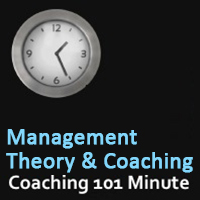The terms “executive coaching” and “business coaching” began to be used in leadership development programs during the 1980’s.
 Although the term “coaching” was not used earlier than this, coaching shares a theoretical basis with management theories that appeared as early as the 1960’s, including a major one called Theory X and Theory Y. In the 1960’s Douglas McGregor at the MIT Sloan School of Management described two very different attitudes toward workforce motivation. McGregor felt that companies followed either one or the other approach.
Although the term “coaching” was not used earlier than this, coaching shares a theoretical basis with management theories that appeared as early as the 1960’s, including a major one called Theory X and Theory Y. In the 1960’s Douglas McGregor at the MIT Sloan School of Management described two very different attitudes toward workforce motivation. McGregor felt that companies followed either one or the other approach.
.
Theory X
The Theory X view assumes that employees are inherently lazy and will avoid work if they can. Because of this, workers need to be closely supervised and comprehensive systems of controls developed. A hierarchical structure is needed with narrow span of control at each level. According to this theory, employees will show little ambition without an enticing incentive program and will avoid responsibility whenever they can.
A Theory X manager believes that his or her employees do not really want to work, that they would rather avoid responsibility and that it is the manager’s job to structure the work and energize the employee. The result of this line of thought is that Theory X managers naturally adopt a more authoritarian style based on the threat of punishment.
Theory Y
The Theory Y view assumes that employees are self-motivated, anxious to accept greater responsibility, and exercise self-control and self-direction. It is believed that on the whole, employees enjoy their mental and physical work duties. It is also believed that if given the chance employees have the desire to be creative and forward thinking in the workplace. There is a chance for greater productivity by trusting employees to perform at the best of their abilities.
A Theory Y manager believes that, given the right conditions, most people will want to do well at work and that there is a pool of unused creativity in the workforce. They believe that the satisfaction of doing a good job is a strong motivation in and of itself. Rather than trying to control, a Theory Y manager will try to remove the barriers that prevent workers from fully actualizing themselves.
Coaching And Theory Y
Coaching shares the view of employees outlined by McGregor’s Theory Y and most organizations that employ corporate or executive coaches would also share this view. More recently, as organizations have moved into the so called “information age”, the Theory Y view of human performance has become even dominant in management theory. New technology and globalization have led to people having access to huge amounts of information at precisely the time that they need it. Whole countries are shifting from growing and producing “things” to providing knowledge and services and becoming so-called “knowledge economies”. For the first time in history, managers can no longer be assumed to know more about the business than their staff. Suddenly knowledge sharing, creativity and lateral thinking are becoming key competencies in every level of a business.
Training FAQ
Other questions that were asked in Coaching 101 this week.
- How long does the average student take to graduate?
- Will there be anyone from my local area
- Can I retake a class?
Come along to an upcoming Coaching 101 class and learn more about coaching in general as well as programs offer here at ICA.